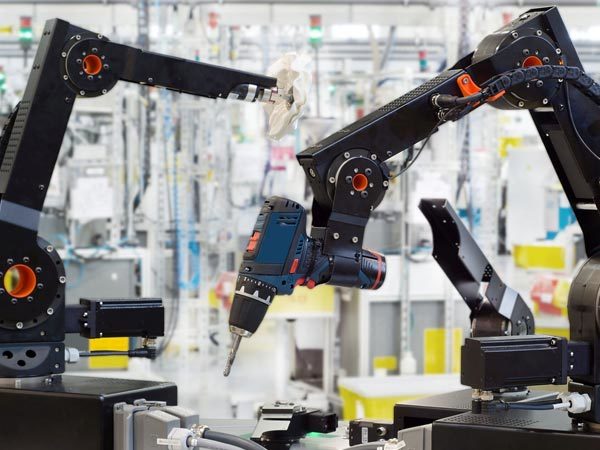Why are many large companies now choosing to use robots instead of manual labor?
Release time:
2024-07-04
The progress and application of robotics technology is unstoppable, and robots have earned their status and value in some fields. However, whether robots can replace human labor is still a controversial and subjective issue. In the future social and labor relations, robots and human labor need to work together to better meet human needs and interests. Only when human needs and interests are in a middle position can robotics technology become a booster for our social progress.

Robotics has made great progress in the past few decades and has gradually moved towards commercialization and industrialization. In many fields, their application has made progress and achieved results. Many people are worried that with the development of robotics, they can replace human labor and become the protagonist of our social productivity. In fact, this is a complex and controversial issue, considering the advantages, disadvantages, limitations and relationship between robotics and human labor. First of all, robots have certain advantages that may far exceed human labor. For example, robots can undertake some repetitive, monotonous or dangerous tasks, they can provide continuous benefits and are not affected by fatigue, muscle pain and other health problems.
In addition, robots can also be competent when tasks need to be performed quickly and with high quality. In some fields, the development and application of robotics may lead to the loss and replacement of manual employment. For example, in the manufacturing industry, many traditional factory laborers have been replaced by industrial robots or automated equipment. Similarly, in service industries, such as restaurants or stores, self-service checkout and ordering machines have become common, replacing the roles of human cashiers or waiters. However, it is inaccurate and impractical to generalize whether robots can replace human labor. Because robots and personnel have their own technologies and limitations, their applications in different fields are also very different. First, robotics technology is generally limited to performing prescribed work, production or service processes. They need to perform specific tasks in a pre-programmed manner, which is different from the creativity, flexibility and judgment of human labor.
Although humans may make mistakes when performing special tasks and dealing with complex environments, it is this kind of mistakes and creative performance that determines human productivity and innovation. Secondly, robots need to adapt to specific environmental conditions and technical applications. For example, robots may encounter more difficulties and limitations in small and uneven workplaces; robots are also relatively poor in service areas that require intuitive judgment and negotiation. In addition, even in areas where robots can complete certain tasks, cooperation and coordination between humans and robots are still inevitable, such as robotic arms and doctors' guidance in surgery. Compared with the wisdom and judgment possessed by humans, robotics technology has many technical and ethical limitations. Although robots can simulate the performance of artificial intelligence in certain tasks, their decisions and actions rely on constraints and procedures set by humans. Artificial intelligence cannot replace the decision-making power and ethical judgment possessed by humans, such as how to deal with the mistakes and responsibilities of artificial intelligence morally and legally.
In summary, the progress and application of robotics technology are unstoppable, and robots have won their status and value in some fields. However, whether robots can replace human labor is still a controversial and subjective issue. In the future social and labor relations, robots and artificiality need to work together to better meet human needs and interests. Only when human needs and interests are in the middle can robotics become a booster for our social progress.
Latest News
Building an Efficient and Neat Automated Palletizing Line
Faced with tens of thousands of cartons of products daily, how can you achieve efficient and neat palletizing operations? Carton palletizers, with their professional performance and stable operation, are the best choice for modern warehousing and logistics!
2025-12-01
Vertical Palletizer: A High-Efficiency Palletizing Solution for Space-Confined Factories
In modern factory production, space utilization directly impacts overall operational efficiency. The vertical palletizer, with its unique vertical structure design, is becoming the ideal choice for companies with limited space!
2025-11-24
Industrial Robots Enable Unmanned Factories
In the wave of intelligent manufacturing, unmanned factories are moving from concept to reality. Industrial robots, as core equipment, are accelerating this revolutionary transformation with their superior automation capabilities.
2025-11-17
Corn Germ Palletizing Robot: The Intelligent Handling Expert Safeguarding Nutrition
In the corn deep processing industry, corn germ, as a high-nutritional-value raw material, presents a dual challenge of hygiene and efficiency in its palletizing process. Corn germ palletizing robots, with their professional performance, are becoming the preferred solution for industry upgrades!
2025-11-10
Column Robots: Intelligent Material Handling Experts with Big Impact in Small Spaces
In modern factories where space resources are increasingly scarce, column robots, with their unique structural advantages, are becoming a rising star in the field of intelligent material handling! This robot, designed specifically for compact spaces, is redefining the infinite possibilities of efficient warehousing.
2025-11-03
Unpacking and Feeding Robots: Ushering in a New Era of Unmanned Raw Material Handling!
In modern factories, raw material unpacking and feeding are experiencing revolutionary breakthroughs! By fully automating the entire process, unpacking and feeding robots completely eliminate the pain points of manual operations, such as low efficiency, excessive dust, and high labor intensity.
2025-10-27




